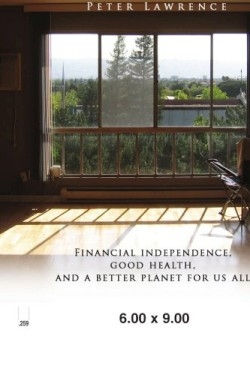The Happy Minimalist
Financial Independence, Good Health, and a Better Planet for Us All
It doesn’t take much to make Peter Lawrence happy: a lawn chair, a clean sleeping bag liner, a good library within walking distance, his laptop with USB TV tuner that can store everything from financial records to personal photos, and a used (but seldom used) Honda Civic. Some readers will find him eccentric, to say the least. But they will also see that he is a happy guy with good advice for living a clutter-free life.
Lawrence retired from the working world at an early age. He is debt-free. He has no need for prescription drugs or over-the-counter medications. His floor-to-ceiling window gives him a view of the sun rising over the mountains and enough light that he rarely needs to burn a compact fluorescent bulb. Peter Lawrence is the consummate minimalist. His purpose in this book is to show that material wealth has little to do with happiness, and to teach readers how to weed the excesses that can clog their lifestyles. His ideal is “a simple and humble life.”
The author makes the point that, in America today, people unwittingly consume products that they don’t need, and that this inefficient, irresponsible consumption is often not good for them and may do harm to others or to the planet. He urges consumers to discard the notion that they must contribute to an ever-rising GNP, and would have them instead consider GNH, or Gross National Happiness. Lawrence’s idea of minimalism is not confined to purchasing. Time, money, food, effort, and even thoughts are subject to the chopping block for a true minimalist. “Simplify your life,” he exhorts. “Do it for your soul. Do it for the planet. If you don’t believe in either of these, do it for your own health and your finances.” The point seems obvious enough, but Lawrence makes it new by laying bare his unique lifestyle and presenting a method for the novice minimalist. He shows readers how to separate personal needs from superfluous wants, and suggests ways to consume fewer products and services and to minimize routines.
As proof that a minimalist can be happy, Lawrence offers his own life. He was raised in Singapore and holds degrees from Australian and American universities. He has served as a soldier and spent some time in a Catholic monastery in New Zealand. He has travelled extensively and experienced much. He advises readers to put happiness first, basing their lifestyles on needs and on the things they want most before they die. Lawrence’s book is short, and his prose is easy and unadorned. Readers may occasionally stumble over an awkward phrase, but they will never doubt the authenticity of the writer or the clarity of his message.
Disclosure: This article is not an endorsement, but a review. The publisher of this book provided free copies of the book and paid a small fee to have their book reviewed by a professional reviewer. Foreword Reviews and Clarion Reviews make no guarantee that the publisher will receive a positive review. Foreword Magazine, Inc. is disclosing this in accordance with the Federal Trade Commission’s 16 CFR, Part 255.


